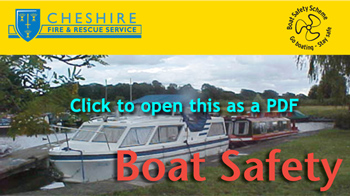Services Guide  Boat Safety
Boat Safety
 Boat Safety
Boat Safety
KEY SAFETY MESSAGES — issued by the Cheshire Fire & Rescue Service
Escape Plans
- Means of escape should be adequate and sufficient.
- Means of escape should be clear and free from obstruction.
- Means of escape should be free from trip/slip hazards.
- Have an alternative route in case the normal route gets blocked.
- All doors or windows for means of escape should open easily in the event of a fire; keep keys to door and window locks handy.
- If a window needs to be broken, use a heavy object to break the glass in the bottom corner and cover jagged edges of glass with a towel to avoid injury.
- Plan ahead together - prepare and agree an escape plan with those on board, including visitors.
- In the event of a fire everyone should stay calm and get off the boat as quickly as possible.
- Everyone should keep low where the air is clearer.
- If clothing catches fire, stop, drop and roll. Use a fire blanket to smother the flames.
- Always try to remember the location of the boat; it will be essential information in the event of an emergency.
- Do not go back onto the boat - GET OUT, STAY OUT and dial 999!
Communications
- How to make ‘999’ call including:
- Name of caller.
- Location i.e. Canal / River, Bridge Marker Posts, Landmarks etc.
- Nature of emergency.
- Which Service i.e. Police, Ambulance, Fire or Coastguard etc.
- If anyone is trapped and where they are.
- Speaking slowly and clearly.
- Using mobile telephones, poor signal strengths etc.
Night-Time Routines
- Smokers - ensure all cigarette ends are extinguished in ashtrays.
- Dispose of ashtray contents in suitable flameproof container.
- Isolate the gas supply to cooking appliances.
- Switch off and unplug electrical appliances unless designed to be left on.
- Make sure that all candles are correctly extinguished.
- Close solid fuel / oil room heater doors to prevent fumes / sparks entering the accommodation space, put up fireguards.
- A torch will prove invaluable in the event of an emergency. Check it to ensure it is in working order and make sure that it is within easy reach.
- Keys should be kept in a prominent position for use in an emergency.
Smoke Alarms
- A smoke alarm is a vital warning device that detects smoke at the earliest stages of a fire giving the occupier extra time to escape.
- Smoke alarms should be installed and tested to manufacturers’ recommendations.
- Smoke alarms with 10 year batteries should be installed.
- Smoke alarms should be tested weekly to ensure their operation.
- Batteries should not, under any circumstances, be removed.
- Periodic ‘beeping’ of the smoke alarms means that the battery needs replacing. Replace the whole unit if it is a 10 year battery!
For more information visit our website www.cheshirefire.gov.uk
| < Prev | Next > |
|---|
Posted by Gadge
Mar 07, 2010
Last Updated:
Mar 07, 2010
